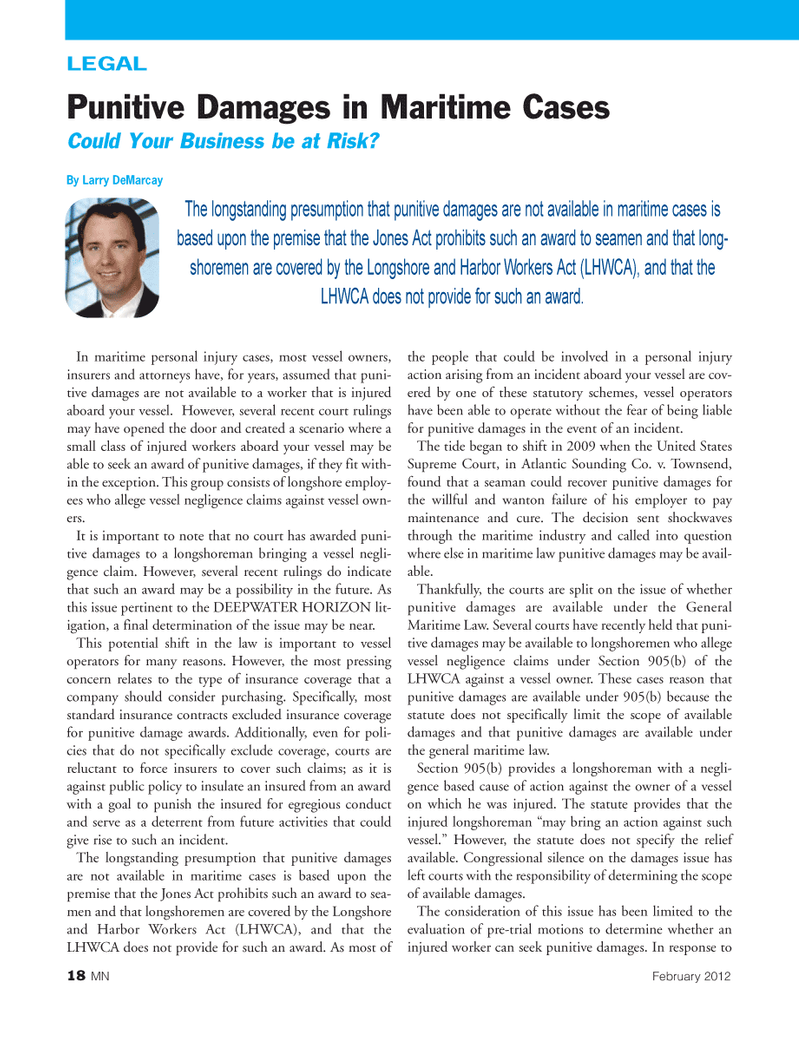
Page 18: of Marine News Magazine (February 2012)
Inland Bulk Transportation
Read this page in Pdf, Flash or Html5 edition of February 2012 Marine News Magazine
In maritime personal injury cases, most vessel owners, insurers and attorneys have, for years, assumed that puni- tive damages are not available to a worker that is injured aboard your vessel. However, several recent court rulings may have opened the door and created a scenario where a small class of injured workers aboard your vessel may be able to seek an award of punitive damages, if they fit with- in the exception. This group consists of longshore employ- ees who allege vessel negligence claims against vessel own- ers.It is important to note that no court has awarded puni- tive damages to a longshoreman bringing a vessel negli- gence claim. However, several recent rulings do indicate that such an award may be a possibility in the future. As this issue pertinent to the DEEPWATER HORIZON lit- igation, a final determination of the issue may be near. This potential shift in the law is important to vessel operators for many reasons. However, the most pressing concern relates to the type of insurance coverage that a company should consider purchasing. Specifically, most standard insurance contracts excluded insurance coverage for punitive damage awards. Additionally, even for poli- cies that do not specifically exclude coverage, courts are reluctant to force insurers to cover such claims; as it is against public policy to insulate an insured from an award with a goal to punish the insured for egregious conduct and serve as a deterrent from future activities that could give rise to such an incident. The longstanding presumption that punitive damages are not available in maritime cases is based upon the premise that the Jones Act prohibits such an award to sea- men and that longshoremen are covered by the Longshore and Harbor Workers Act (LHWCA), and that the LHWCA does not provide for such an award. As most of the people that could be involved in a personal injury action arising from an incident aboard your vessel are cov- ered by one of these statutory schemes, vessel operators have been able to operate without the fear of being liable for punitive damages in the event of an incident. The tide began to shift in 2009 when the United States Supreme Court, in Atlantic Sounding Co. v. Townsend, found that a seaman could recover punitive damages for the willful and wanton failure of his employer to pay maintenance and cure. The decision sent shockwaves through the maritime industry and called into question where else in maritime law punitive damages may be avail- able. Thankfully, the courts are split on the issue of whether punitive damages are available under the General Maritime Law. Several courts have recently held that puni- tive damages may be available to longshoremen who allege vessel negligence claims under Section 905(b) of the LHWCA against a vessel owner. These cases reason that punitive damages are available under 905(b) because the statute does not specifically limit the scope of available damages and that punitive damages are available under the general maritime law. Section 905(b) provides a longshoreman with a negli- gence based cause of action against the owner of a vessel on which he was injured. The statute provides that the injured longshoreman ?may bring an action against such vessel.? However, the statute does not specify the relief available. Congressional silence on the damages issue has left courts with the responsibility of determining the scope of available damages. The consideration of this issue has been limited to theevaluation of pre-trial motions to determine whether an injured worker can seek punitive damages. In response to By Larry DeMarcay Punitive Damages in Maritime CasesCould Your Business be at Risk?LEGAL18MNFebruary 2012 The longstanding presumption that punitive damages are not available in maritime cases is based upon the premise that the Jones Act prohibits such an award to seamen and that long- shoremen are covered by the Longshore and Harbor Workers Act (LHWCA), and that the LHWCA does not provide for such an award. MN#2 (18-31):MN 2011 Layouts 2/3/2012 11:30 AM Page 18

 17
17

 19
19
